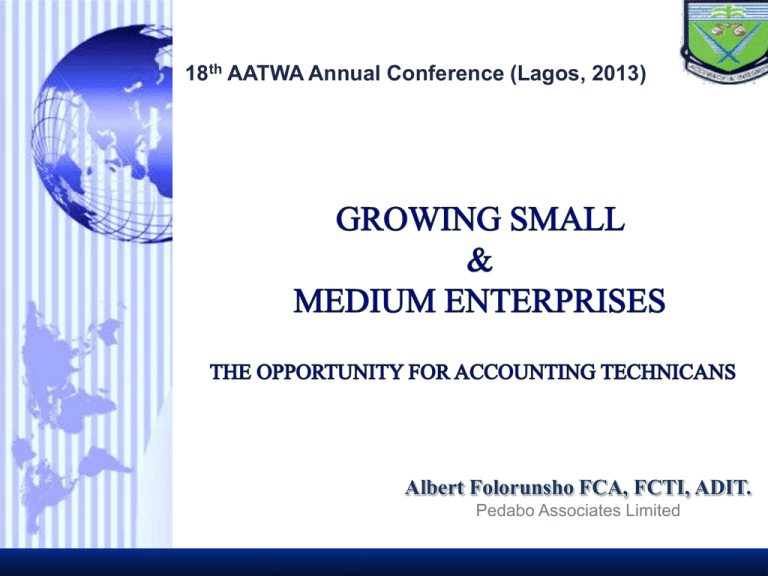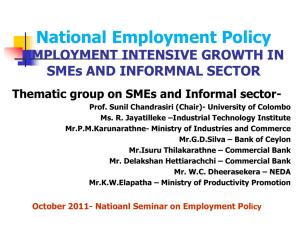GROWING SMALL AND MEDIUM ENTERPRISES
advertisement

18th AATWA Annual Conference (Lagos, 2013) Albert Folorunsho FCA, FCTI, ADIT. Pedabo Associates Limited Albert Folorunsho INTRODUCTION 1 • SMEs play an important role in a Nation’s economic development 2 • SMEs are largest employers of labour in the economy 3 • Nigeria needs to support the growth of SMEs as a tool for its overall economic development 4 • Major impediments of the SME sector in Nigeria include: Infrastructural decay, Funding problems, Unhealthy competition by MNEs 5 • The fortunes of SMEs need to be reversed if the millennium goals are to be achieve Albert Folorunsho 2 INTRODUCTION -Cont’d At the end of the presentation, participants will be more acquainted with: Global definitions of SMEs The roles and significance of SMEs in an economy Problems limiting the success of SMEs with particular reference to Nigeria. The roles accountants play for the SMEs and the opportunities for Accounting Technicians Albert Folorunsho 3 1 SMEs Definition / Classification Albert Folorunsho 4 SMEs Definition / Classification The UN and OECD have provided general criteria for SME definition; o Turnover o Asset base o Number of employees Japanese Ministry of Economy, Trade and Industries defines SMEs as follows: Capital Employees • Retail & service sector Wholesale Sector Manufacturing Sector • • Albert Folorunsho ≤ USD 600,000 < USD1.2 Million <USD3.6 Million <50 <100 <300 5 SMEs Definition / Classification - Cont’d Small Business Administration of USA defines SMEs as businesses that are: o Independently owned and operated o Non-dominant and profit oriented o Classification based on number of employees and sales volume o < 50 employees Albert Folorunsho Turnover ≤ €50 million B/S ≤€43 million 6 SMEs Definition / Classification - Cont’d Ministry of Economic Affairs – Taiwan Manufacturing, Construction, Mining, Quarrying Paid in capital Sales Rev ≤ USD42 million - Agric, forestry, fisheries, water, elect, Gas etc ≤ USD3.03 million IFC & Multilateral Investment Guarantee Agency (MIGA) < 50 employees o < $3million total annual sales o Albert Folorunsho 7 2 Nigeria Albert Folorunsho 8 SME Definition in Nigeria CBN under Small & Medium Enterprise Credit Guarantee Scheme(SMECGS) a. o Asset Base (excluding land) – between N5m & N500m. o Labour force - between 11 and 300 employees National Council of industry (2001) b. Employee ≤ 300 - Asset base ≤ N200 million - National Policy on SMEs c. - Albert Folorunsho Micro enterprises - ≤ 10 employee and <45 million asset base Small Enterprise between 10 – 49 employees and between N5m & N50m asset base Medium Enterprise: From 50 – 199 employees 9 Roles & Significance of SMEs The following have been said of SMEs: • SMEs contributes 50% of GDP …..(OECD). • 65% of employment in high income countries are from SMEs. • SMEs generate 70% - 90% of employment in middle income countries. • Significant impact on the export earnings in developing countries. • SMEs enhances entrepreneurship innovation and invention Albert Folorunsho 10 Roles & Significance of SMEs - Cont’d • SMEs drive technology change and growth in productivity • Catalyst to private sector development • According to IFC, 96% of business in Nigeria fall under SMEs • 90% of manufacturing and industrial sector in numbers fall under SMEs. Albert Folorunsho 11 Problems Limiting the Success of SMEs in Nigeria • Deficient public infrastructure • Bureaucratic bottlenecks & inefficiency in the administration of incentives • Lack of easy access to funds • Discrimination by banks, due to credit risk • High cost of packaging appropriate business proposals • Uneven competition and preference for imported products • Dependence on imported raw materials – foreign exchange risks • Low and dwindling consumer purchasing power resulting in low demand for local products • Dumping & importation of substandard products Albert Folorunsho 12 Problems Limiting the Success of SMEs in Nigeria – Cont’d • Inadequate educational & technical background. • Weakness in organization, marketing, personnel, accounting records and information usage, processing & retrieval. • Multiplicity of regulatory agencies & taxes, increasing high cost of doing business. • Absence of long term finance. • Poor intellectual capital resources • Lack of appropriate & adequate managerial & entrepreneur skills • Inadequate training & leadership development Albert Folorunsho 13 Agencies set up to support SMEs • Small & Medium enterprises credit Guarantee Scheme (SMECGS) of CBN. • Small & Medium Industries Equity Investment Scheme (SMIEIS) of CBN. • Family Economic Advancement Program (FEAP) • Industrial Development and Coordinating Centre. • National Directorate of Employment • Nigerian Bank for Commerce & Industries (NBCI) Albert Folorunsho 14 Agencies set up to support SMEs – Cont’d • Nigerian Industrial Development Bank (NIDB) • National Economic Reconstruction Fund (NERFUND) • The African Development Bank / Export Stimulation Loan (ADB/ESL) • Nigerian Export Import Bank • Microfinance Banks • Bank of Industry (BOI) • Small & Medium enterprises Development Agency of Nigeria (SMEDAN). Albert Folorunsho 15 Major Areas Identified for Development to boost SMEs • Institutional, Legal & Regulatory framework. • Human Resource Development. • Technology, Research & Development. • Extension & Support Services • Marketing • Infrastructure • Finance. Albert Folorunsho 16 Other Steps to boost SMEs Growth • Nigerian Investment Promotion Commission (NIPC). • Nigerian Export Promotion Commission (NEPE) • The Industrial Development Act. • Nigerian Content Development Act. • Private Sector participation in Power, Tourism, Manufacturing and Export. • Solid Mineral Mining etc. Albert Folorunsho 17 3 The Roles of the Accountant Albert Folorunsho 18 The Roles of the Accountant • Accountability and Planning. • Feasibility Report. • Business Plan Preparation. • Financial Modeling. • Accounting Services & Book Keeping. • Tax Management Services. • IT Services. • Audit & Assurance Services. • Asset Verification & Certification. Albert Folorunsho 19 Competence Areas for the Accounting Technicians • Budget Preparation • Cashflow forecasting • Basic Accounting functions Analysis of payables & receivables Bank Reconciliation Petty cash management functions General Ledger entry. • Tax Compliance functions • Payroll management functions • Preparation of management accounts. • Basic internal control functions Albert Folorunsho 20 Opportunities for and place of the Accounting Technicians. • Employment opportunities • As accounts officers in SMEs. • Outsourcing materials for big/medium size firm. • Direct contract services for SMEs. • Assist SMEs to be complaint with IFRS effective from 2014. • Ample opportunity to diversify from Accounting Profession to several lines of business under the SMEs schemes. Albert Folorunsho 21 4 Thank You Albert Folorunsho 22









